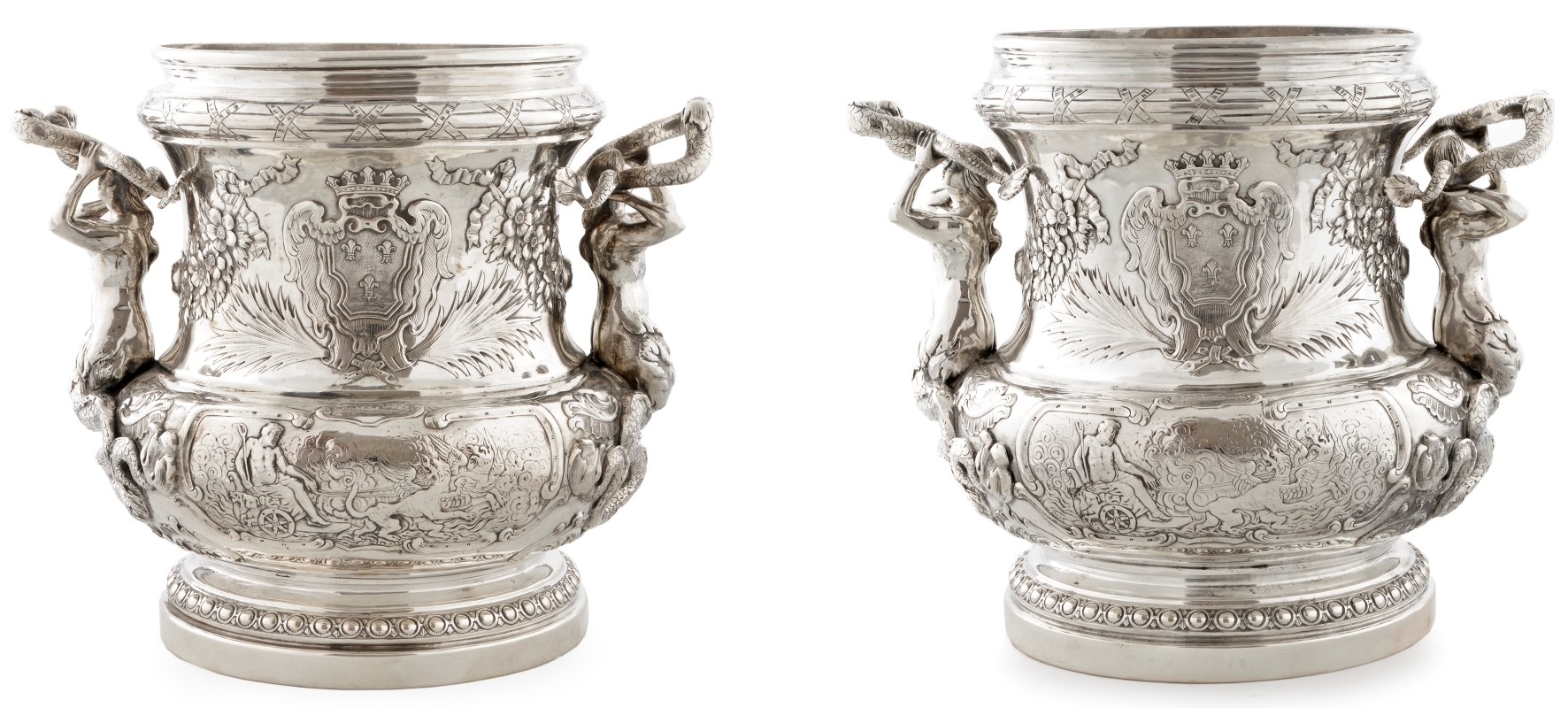Post auction round up: Fine Interiors including Selected Furniture from Hotham Hall, Yorkshire | 28 July
POST AUCTION HIGHLIGHTS from THE PEDESTAL
FINE INTERIORS including SELECTED FURNITURE FROM HOTHAM HALL, YORKSHIRE
28 July 2020
Fine Interiors including Selected Furniture from Hotham Hall, Yorkshire was The Pedestal’s first auction to be held at The Dairy, on the Stonor Park Estate, located close to Henley-on-Thames, the Oxfordshire town perhaps best known for its annual sporting and social event, the Henley Royal Regatta. Stonor Park has been lived in by the Stonor family for 850 years, and it is one of the oldest family homes still lived in today.
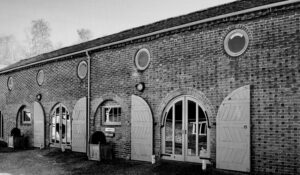
The Pedestal’s new base: The Dairy, on the Stonor Park estate, near Henley-on-Thames, Oxfordshire
Sally Stratton, Director, at The Pedestal, said, ‘We were extremely pleased with the results of the auction; we saw strong bidding in the room, on the ‘phone, and clients at home were bidding using our new App. We are delighted to be based at The Dairy, it is a tremendous location for us, it’s accessible from London and opens up a whole new area of the country to The Pedestal. We saw many new faces at the busy pre-auction viewing, and it was a pleasure to present the sale to many existing and first time clients’.
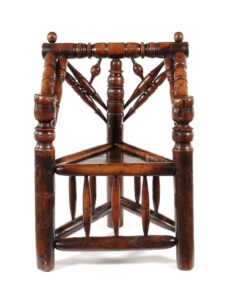
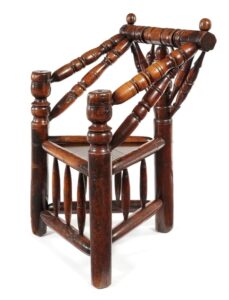
From Hotham Hall: a Charles I yew triangular Turner’s chair, English or Welsh, circa 1640 | sold for: £10,625
The auction opened with a private collection of thirty seven items of early furniture from Hotham Hall, Yorkshire. Hotham Hall was built c. 1720 and over the centuries various additions have been made to its structure, it sits surrounded by gardens, kitchen gardens, parkland and plantations. The present owner’s parents collected antiques and the interest passed to their son, who when settled at Hotham Hall honed his collecting focus on early furniture, in oak and walnut, which was mostly acquired over long weekends spent in the Cotswolds.
From Hotham Hall: showing above, a Charles I yew triangular Turner’s chair, English or Welsh, c. 1640, (est. £3,000-5,000, sold for £10,625), this piece received a lot of attention during the auction viewing due to its striking design and great colour, combined with its showpiece looks and academic credentials. Turner’s chairs are assembled with green timbers and in the shrinking process the joints tighten, resulting in an incredibly strong, robust chair.
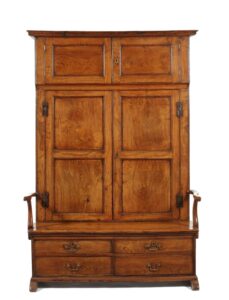
From Hotham Hall: George II figured ash panelled back bacon settle | sold for: £3,750
Also from Hotham Hall and dating from the George II era, above, a figured ash panelled back bacon settle, (est. £3,000-5,000, sold for £3,750) – bacon settles are thoroughly practical items of furniture combining storage with seating, and they are typically associated with the West Country and Wales. This piece is panelled to both front and back, so it does not need to be placed against a wall, and along with its extremely fine colour it qualifies as a high quality example of the genre.
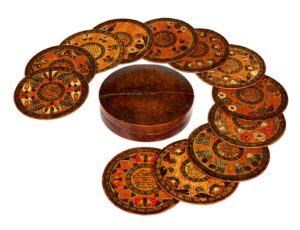
A rare set of twelve Elizabethan sycamore painted roundels or fruit trenchers | sold for £10,000
From Other Properties, showing above, a rare set of twelve Elizabethan sycamore painted roundels or fruit trenchers were presented in their original case, and it is extremely rare for full sets such as this to have survived, (est. £8,000-10,000, sold for £10,000). Each roundel is centred by a different verse or poesie within a gilded, scrolled and floral border. The set also boasts incredible provenance, having previously been owned by the renowned Victorian mathematician, philosopher and ‘father of the computer’, Charles Babbage (1792-1871), whose Calculating Machine is on display at the Science Museum, London. The set had remained in the Babbage family until 1934 when it was then sold at auction by one of his descendants.
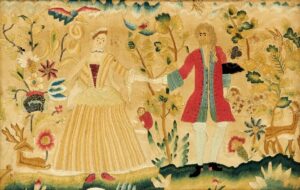
Early 18th century embroidered picture | sold for: £3,750
Another highlight, an early 18th century English embroidered picture depicts a lady and gentleman in an imagined, fanciful countryside scene – the couple hold hands and are surrounded by an array of flowers, foliage, animals, birds and insects. This charming piece worked in long and short stitches with strong-coloured silks and a lively design realised double its pre-sale estimates in the auction, (est. £1,500-2,000, sold for £3,750).
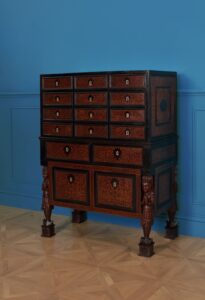
A 17th century Indo-Portuguese teak, ebony and ivory marquetry Contador or Standing Cabinet | sold for: £16,250
The 17th century Indo-Portuguese teak, ebony and ivory marquetry Contador or Standing Cabinet, (est. £6,000-8,000, sold for £16,250), above, is an example of a piece not often seen at auction, it received much attention during the view and competitive bidding in the auction. The cabinet typifies the exotic furniture made for Portuguese traders in Indian and Goanese ports in the 17th century, and a cabinet of similar form is on display in the V&A Museum, London. It is attributed to Goa partly based on purpose built church furniture closely related in style to be found in the Sacristy of the Born Jesus, Old Goa. The fitted chests of drawers and cabinets in the Sacristy are likely to have been installed at some point between 1654 and 1698. The Contador here is consistent with many other surviving examples, with its mermaid-like figural supports on the base, which may correspond to naginis, female snake-like demi-gods in Hindu iconography symbolising prosperity.
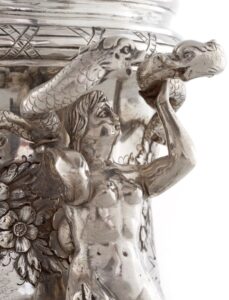
Detail from a pair of German wine coolers, Wolf & Knell, Hanau | sold for: £8,750
From a number of fine silver pieces – an elaborate pair of German silver wine coolers by Wolf & Knell, Hanau, circa 1895, above, after the rococo manner of Meissonnier and chased with cartouche depicting three fleur-de-lys, ribbons, panels with classical gods being drawn in chariots, including Poseidon with trident carried over the waves, with mermaid figural side handles clasping the necks of dolphins, (est. £7,000-8,000, sold for £8,750).
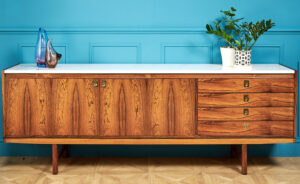
The next auction at The Pedestal will be Design for Living, on November 10th. The focus in this new sale format will be on key styles from Rustic to Mid-century Modern, taking in pieces from all the major design movements. Pieces on offer will cover a wide range: furniture, objects, carpets and rugs, ceramics and silver, and will appeal to a broad group of clients: established and new collectors, as well as professionals, such as interior decorators looking to source unique statement pieces for projects and schemes.
